@
springboot 创建web项目只需要引入对应的web-starter,自己定义好moudel层,再采用相应的模版引擎技术(view层)就可以将数据渲染到模版中,从而生成一个单体的web应用!那这些视图是如何解析的呢?最常用的模版引擎语法有哪些呢?
新建一个空的项目,我们选择对应的web依赖,工具相关我三个都勾选上,数据库驱动选mysql驱动!具体见我的另一篇博客:
springboot集成mybatis和druid监控,此处不再赘述.
创建好项目后,我们来分析下源码
源码分析
首先我们都知道,springboot初始化的项目下面都是没有webapp这样一个模块的,那我们的web相关的一些资源,该放在哪里呢?为何对应的放置就可以生效呢?
我们尝试从源码中寻求答案
SpringMVC 整个 SSM 都是基于它的,所以我们第一步应该去研究 SpringBoot 关于Mvc的自动配置!
- 1、所有mvc相关的配置都在 WebMvcAutoConfiguration (视图解析器、静态资源过滤!)
- 2、addResourceHandlers 静态资源处理方法
@Override
public void addResourceHandlers(ResourceHandlerRegistry registry) {
//禁用默认规则的一个配置,如果你手动的添加了资源映射路径的配置,那么这些自动配置就会直接失效!
if (!this.resourceProperties.isAddMappings()) {
logger.debug("Default resource handling disabled");
return;
}
// 缓存控制
Duration cachePeriod = this.resourceProperties.getCache().getPeriod();
CacheControl cacheControl = this.resourceProperties.getCache().getCachecontrol().toHttpCacheControl();
// 分析源代码,需要掌握看对象的方法调用!
// localhost:8080/webjars/jquery.js
// 判断是否存在一个映射路径 /webjars/**,
// addResourceHandler 处理逻辑 /webjars/a.js
// addResourceLocations 处理资源的地址 classpath:/META-INF/resources/webjars/a.js
if (!registry.hasMappingForPattern("/webjars/**")) {
customizeResourceHandlerRegistration(registry.addResourceHandler("/webjars/**")
.addResourceLocations("classpath:/META-INF/resources/webjars/")
.setCachePeriod(getSeconds(cachePeriod)).setCacheControl(cacheControl));
}
// 获取静态资源路径!
String staticPathPattern = this.mvcProperties.getStaticPathPattern(); // localhost:8080/
// 如果访问映射的路径是 staticPathPattern = "/**";
// this.resourceProperties.getStaticLocations())
if (!registry.hasMappingForPattern(staticPathPattern)) {
customizeResourceHandlerRegistration(registry.addResourceHandler("/**")
.addResourceLocations(getResourceLocations(this.resourceProperties.getStaticLocations()))
.setCachePeriod(getSeconds(cachePeriod)).setCacheControl(cacheControl)); }
}
// 对应的资源加载先后顺序 优先级:META-INF > resources > static > public
// 对于怎么验证这个优先级,可以建对于的文件加,放些静态资源,页面直接访问测试
private static final String[] CLASSPATH_RESOURCE_LOCATIONS =
{
"classpath:/META-INF/resources/",
"classpath:/resources/",
"classpath:/static/",
"classpath:/public/"
};
我们一句句的解读,就可以读懂源码!可以看到这段源码中就这个webjars我们不怎么熟悉
webjars
什么是 webjars?
webjars是一个前端依赖管理工具,集成了前端主流的一些框架,使得我们只需引入对应的jar包就可以在项目中使用它!
接下来,我们引入jquery的依赖:
<dependency>
<groupId>org.webjars</groupId>
<artifactId>jquery</artifactId>
<version>3.4.1</version>
</dependency>
看下生成的依赖:

我们看下是否可以直接通过路径访问:http://localhost:8080/webjars/jquery/3.4.1/jquery.js
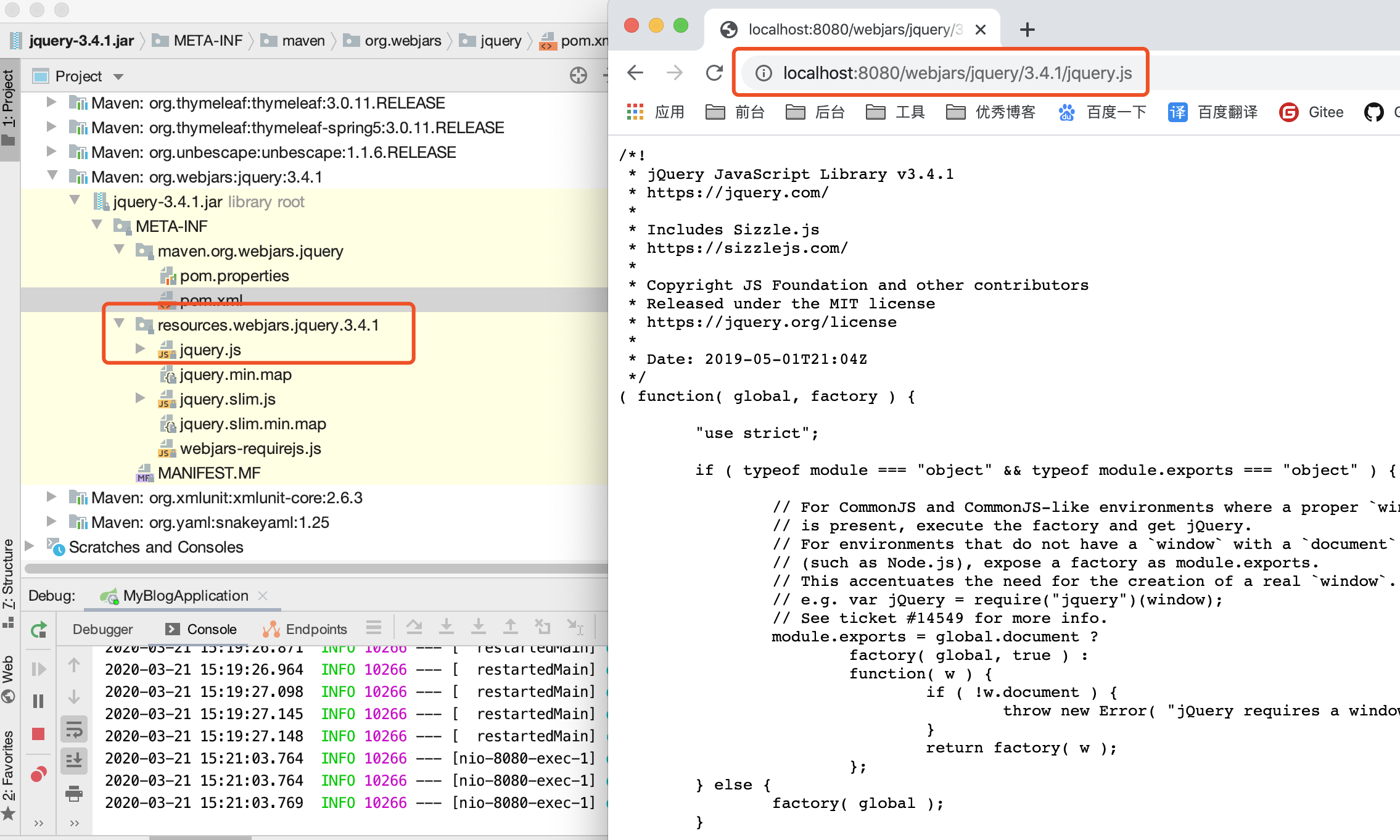
很明显,这样是可以直接访问的。那这些可以常用的框架等静态资源我们可以这样引入,我们自定义的东西例如css 图片等该如何使用呢?
我常用的规则推荐如下:
private static final String[] CLASSPATH_RESOURCE_LOCATIONS =
{
"classpath:/META-INF/resources/", // 在 starter 中使用! SWAGGER-UI
"classpath:/resources/", // 文件资源
"classpath:/static/", // 静态资源
"classpath:/public/" // 公共的,图标......
};
当然我们也可以更改spring的默认资源路径配置:
# 一旦自己配置了 那么默认的就会失效
spring.resources.static-locations=xxx
thymeleaf
- 1.官网:https://www.thymeleaf.org/documentation.html
- 2.github:https://github.com/thymeleaf/thymeleaf/blob/3.0-master
引入依赖,在spring中采用jar一般都是使用对应的starter
<dependency>
<groupId>org.springframework.boot</groupId>
<artifactId>spring-boot-starter-thymeleaf</artifactId>
</dependency>
任何starter都有一个xxxProperties我们去其依赖下看看源码:
@ConfigurationProperties(prefix = "spring.thymeleaf") public class ThymeleafProperties {
private static final Charset DEFAULT_ENCODING = StandardCharsets.UTF_8;
public static final String DEFAULT_PREFIX = "classpath:/templates/";
public static final String DEFAULT_SUFFIX = ".html";
...省略
}
可以看出thymeleaf的默认配置路径是templates下,默认文件格式是.html的
我们要改只需要spring.thymeleaf.prefix=xxx,当然更改了默认的便不会生效了。
测试thymeleaf
templates新增一个页面test.html
<!DOCTYPE html>
<html lang="en">
<head>
<meta charset="UTF-8">
<title>Title</title>
</head>
<body>
<p>hello,thymeleaf!</p>
</body>
</html>
controller中新增一个接口:
package com.blog.controller;
import org.springframework.stereotype.Controller;
import org.springframework.web.bind.annotation.RequestMapping;
@Controller
public class IndexController {
@GetMapping(value = "/test")
public String test(){
return "test";
}
}
启动项目可见:
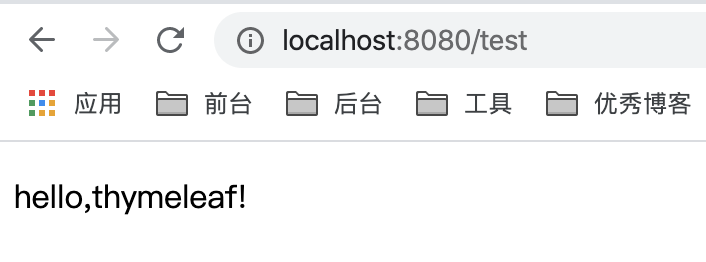
thymeleaf语法
了解了基本的页面渲染规则后,我们来看下thymeleaf的语法:
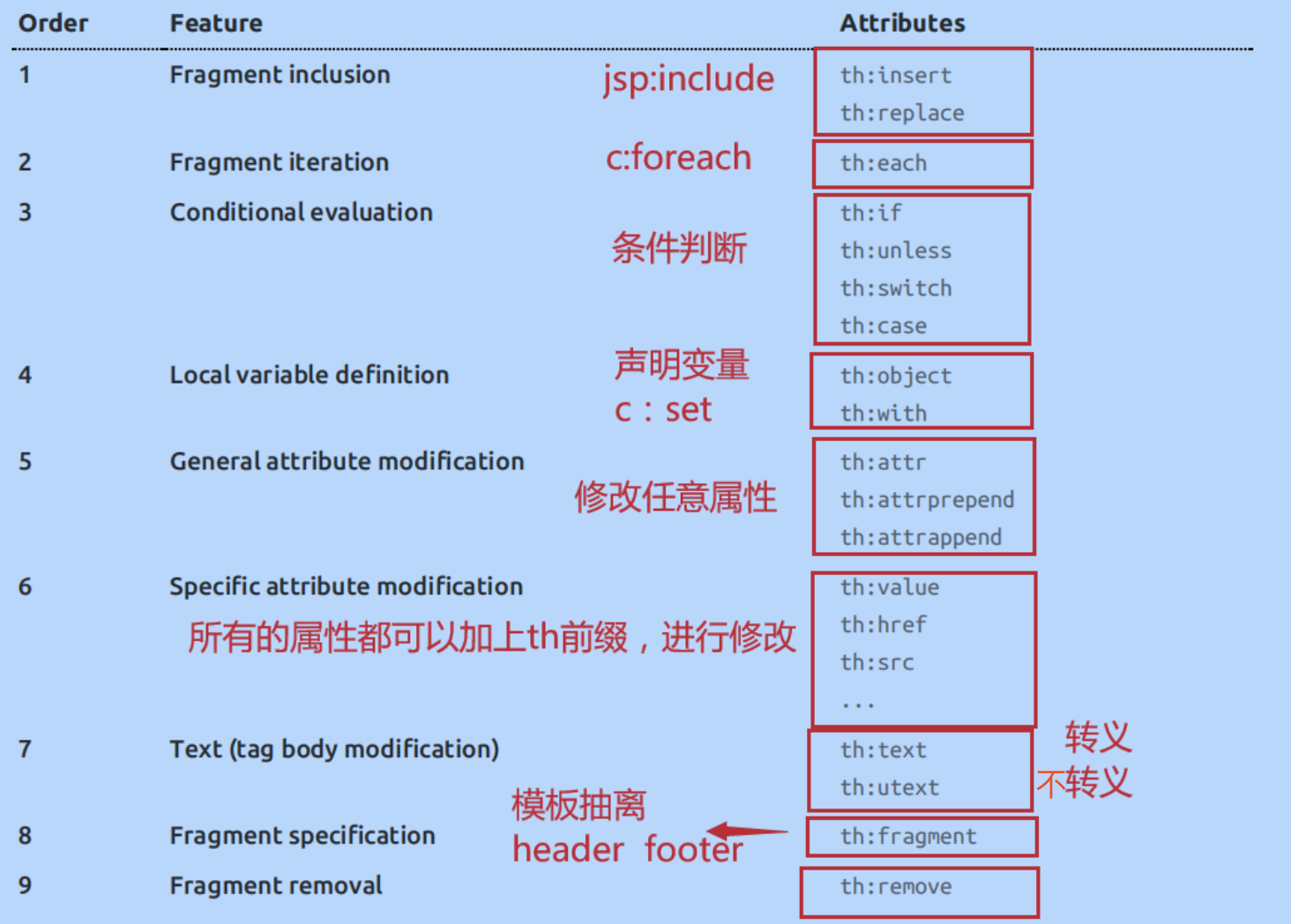
我们还可以编写哪些表达式呢?
Variable Expressions: ${...} 获取一些基本的变量值! OGNL;
- 对象的属性,调用方法
- 使用内置的基本对象
${#ctx.locale}
${param.foo}
${session.foo}
${application.foo}
${#request.getAttribute('foo')}
${#servletContext.contextPath}
- 工具对象
${#messages.msg('msgKey')}
${#uris.escapePath(uri)}
${#conversions.convert(object, 'java.util.TimeZone')}
${#dates.format(date, 'dd/MMM/yyyy HH:mm')}
${#calendars.format(cal)}
${#numbers.formatInteger(num,3)}
${#strings.toString(obj)}
${#arrays.toArray(object)}
.....
4.其他
Selection Variable Expressions: *{...} 选择表达式,和 ${} 是一样的;
Message Expressions: #{...} 国际化内容获取!
Link URL Expressions: @{...} URL表达式;th:href=“@{/login}”
Fragment Expressions: ~{...} 组件化表达式;
Literals (字面量);
Text literals: 'one text' , 'Another one!' ,... (字符串)
Number literals: 0 , 34 , 3.0 , 12.3 ,...
Boolean literals: true , false
Null literal: null
Literal tokens: one , sometext , main ,...
Text operations: (文本操作)
String concatenation: +
Literal substitutions: |The name is ${name}| Arithmetic operations: (数学运算)
Binary operators: + , - , * , / , %
Minus sign (unary operator): -
Boolean operations: (布尔运算)
Binary operators: and , or
Boolean negation (unary operator): ! , not
Comparisons and equality: (比较运算)
Comparators: > , < , >= , <= ( gt , lt , ge , le )
Equality operators: == , != ( eq , ne )
Conditional operators: (条件运算符)
If-then: (if) ? (then)
If-then-else: (if) ? (then) : (else)
Default: (value) ?: (defaultvalue)
Special tokens:
Page 17 of 104**No-Operation:** _
springmvc 启动配置原理
我们来看官方文档,虽然都是英文但是不要怂,慢慢的翻的多了也就认识了!
地址:官网
找到对应的Spring MVC Auto-configuration
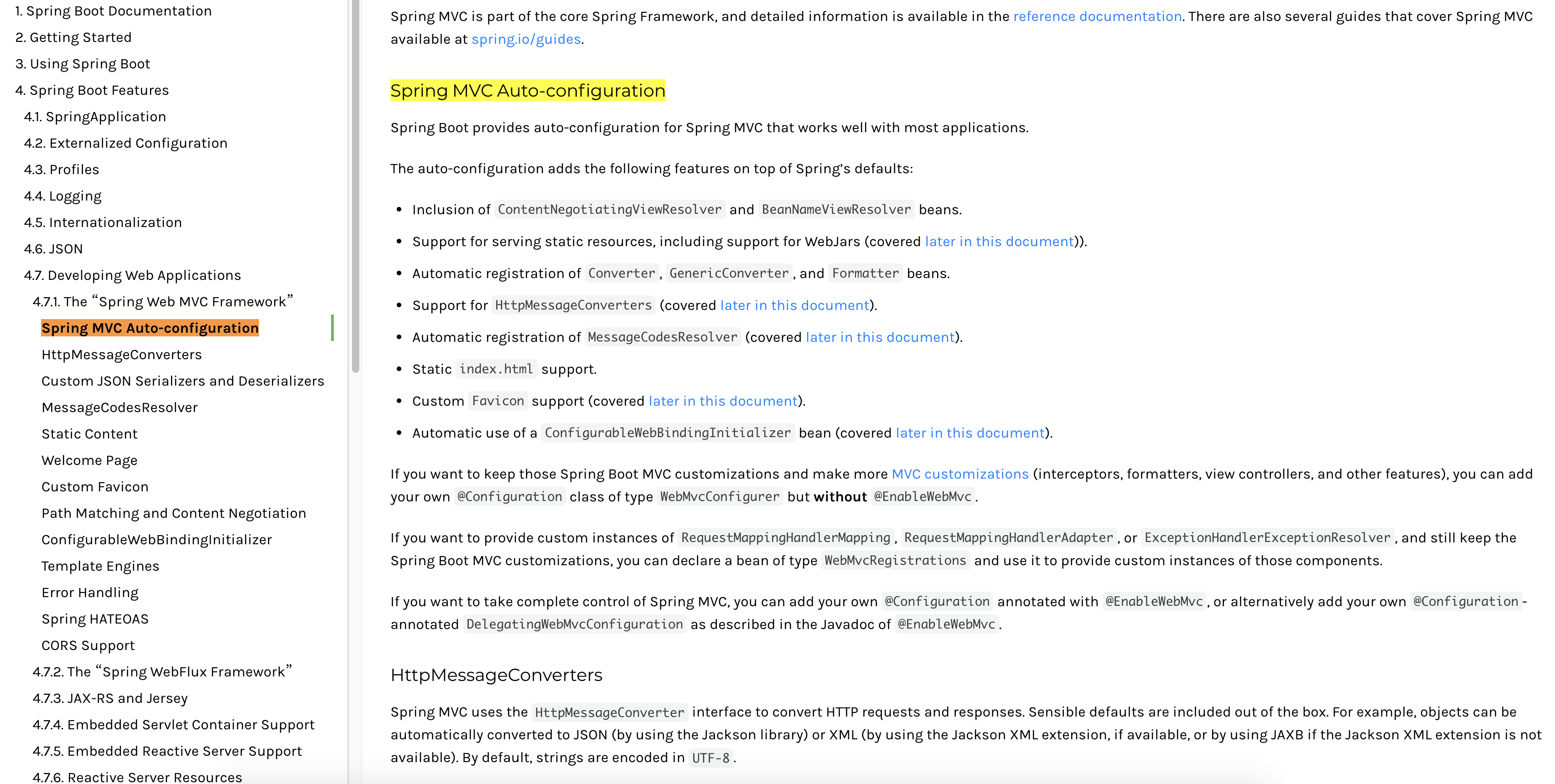
我们来解读下:
Spring MVC Auto-configuration
// SpringBoot为SpringMVC 提供提供了自动配置,他可以很多好的工作于大多数的应用!
Spring Boot provides auto-configuration for Spring MVC that works well with most applications.
// 自动配置在Spring默认配置的基础上添加了以下功能:
The auto-configuration adds the following features on top of Spring’s defaults: // 包含视图解析器
Inclusion of ContentNegotiatingViewResolver and BeanNameViewResolver beans.
// 支持静态资源文件的路径吗,包含webjar的支持
Support for serving static resources, including support for WebJars (covered later in this document)).
// 自动注册了转换器
// 转换器 网页提交的前端对象,到后台自动封装为具体的对象;"1" 自动转换为 数字 1; // 格式化器Formatter 【2020-03-18 后台可以自动封装为Date】
Automatic registration of Converter, GenericConverter, and Formatter beans. // 支持消息转换
// request、response,对象自动转换为 json对象
Support for HttpMessageConverters (covered later in this document).
// 定错代码生成规则
Automatic registration of MessageCodesResolver (covered later in this document). // 支持首页定制
Static index.html support.
// 支持自定义图标
Custom Favicon support (covered later in this document).
//配置web数据绑定
Automatic use of a ConfigurableWebBindingInitializer bean (covered later in this document).
// 如果你希望保持 Spring Boot MVC 一些功能,并且希望添加一些其他的 MVC配置(拦截器、格式化 器、视图控制器、或其他的配置),你可以添加自己的配置类 (类型为WebMvcConfigurer) 需要添加注 解@Configuration ,一定不能拥有注解@EnableWebMvc.
If you want to keep those Spring Boot MVC customizations and make more MVC customizations (interceptors, formatters, view controllers, and other features), you can add your own @Configuration class of type WebMvcConfigurer but without @EnableWebMvc.
//如果要提供RequestMappingHandlerMapping、RequestMappingHandlerAdapter或ExceptionHandlerExceptionResolver的自定义实例,并且仍然保留Spring Boot MVC自定义,则可以声明WebMVCregistration类型的bean,并使用它来提供这些组件的自定义实例
If you want to provide custom instances of RequestMappingHandlerMapping, RequestMappingHandlerAdapter, or ExceptionHandlerExceptionResolver, and still keep the Spring Boot MVC customizations, you can declare a bean of type WebMvcRegistrations and use it to provide custom instances of those components.
// 全面接管Spring MVC,自己配置配置类的时候加上 @EnableWebMvc即可!
If you want to take complete control of Spring MVC, you can add your own @Configuration annotated with @EnableWebMvc, or alternatively add your own @Configuration-annotated DelegatingWebMvcConfiguration as described in the Javadoc of @EnableWebMvc.
我们先分析下为什么加了@EnableWebMvc注解,视图解析器就不生效了,也就是说springmvc这一套东西都不好使了!这个很神奇
源码:
// 如果这个bean不存在,这个类才生效!~
@ConditionalOnMissingBean(WebMvcConfigurationSupport.class)
// @EnableWebMvc 源码
@Import(DelegatingWebMvcConfiguration.class)
public @interface EnableWebMvc
// 点进DelegatingWebMvcConfiguration继承了WebMvcConfigurationSupport
public class DelegatingWebMvcConfiguration extends WebMvcConfigurationSupport
//其实 @EnableWebMvc 就是导入了一个类 WebMvcConfigurationSupport ,但是源码中,一旦导入了 这个类,我们自动配置类就会全部失效!
//如果我们要扩展springmvc
//扩展mvc的方法:
//1、编写一个自己的config配置类
//2、实现一个接口WebMvcConfigurer
//3、重写里面的方法即可!
//@Configuration
//public class MyMvcConfig implements WebMvcConfigurer {
//}
试图解析器
ContentNegotiatingViewResolver
@Bean
@ConditionalOnBean(ViewResolver.class) // 自动配置了 ViewResolver,就是SpringMVC中的视图解析器
@ConditionalOnMissingBean(name = "viewResolver", value = ContentNegotiatingViewResolver.class)
public ContentNegotiatingViewResolver viewResolver(BeanFactory beanFactory) {
ContentNegotiatingViewResolver resolver = new
ContentNegotiatingViewResolver();
resolver.setContentNegotiationManager(beanFactory.getBean(ContentNegotiationMan ager.class));
// ContentNegotiatingViewResolver uses all the other view resolvers to ocate
// a view so it should have a high precedence
// ContentNegotiatingViewResolver 使用其他所有的视图解析器定位视图,因此它应该具有一 个高的优先级!
resolver.setOrder(Ordered.HIGHEST_PRECEDENCE);
return resolver;
}
解析视图名字
resolveViewName
@Override
@Nullable // 参数可以为空
public View resolveViewName(String viewName, Locale locale) throws Exception {
RequestAttributes attrs = RequestContextHolder.getRequestAttributes();
Assert.state(attrs instanceof ServletRequestAttributes, "No current ServletRequestAttributes");
List<MediaType> requestedMediaTypes = getMediaTypes(((ServletRequestAttributes) attrs).getRequest());
if (requestedMediaTypes != null) {
// 获取所有候选的视图!
List<View> candidateViews = getCandidateViews(viewName, locale,
requestedMediaTypes); // 获取最好的视图
View bestView = getBestView(candidateViews, requestedMediaTypes, attrs); // 返回最好的视图
if (bestView != null) {
return bestView;
}
}
String mediaTypeInfo = logger.isDebugEnabled() && requestedMediaTypes != null ? " given " + requestedMediaTypes.toString() : "";
if (this.useNotAcceptableStatusCode) { if (logger.isDebugEnabled()) {
logger.debug("Using 406 NOT_ACCEPTABLE" + mediaTypeInfo); }
return NOT_ACCEPTABLE_VIEW;
}
else {
logger.debug("View remains unresolved" + mediaTypeInfo); return null;
}
}
既然他是从容器中加载所有的视图解析器,那么我们可以猜想,我们自己写一个视图解析器,也可以被 扫描并加载!
// 自己写一个 bean
@Bean
public ViewResolver myViewResolver(){
return new MyViewResolver();
}
private static class MyViewResolver implements ViewResolver{
@Override
public View resolveViewName(String viewName, Locale locale) throws Exception{
return null;
}
}
集成flyway插件
一直知道这么个东西,很好用单独写一篇博客又显得很浪费;那就跟着这篇博客一并说了吧
概念:
Flyway是独立于数据库的应用、管理并跟踪数据库变更的数据库版本管理工具,说白了就是Flyway可以像Git管理不同人的代码那样,管理不同人的sql脚本,从而做到数据库同步
食用方法
如果新建项目可以直接勾选上flyway插件依赖,我们这里没勾选就自己手动添加:
- 添加依赖
<dependency>
<groupId>org.flywaydb</groupId>
<artifactId>flyway-core</artifactId>
</dependency>
- 配置
# 默认不开启flyway
spring.flyway.enabled=false
spring.flyway.baseline-on-migrate=true
# flyway字符编码
spring.flyway.encoding=UTF-8
# flyway文件位置
spring.flyway.locations=classpath:db/migration
# ִV1__xxx.sql v开头默认执行一次
# R1__xxx 开头的脚本则会在项目启动时每次都会清除表后执行
spring.flyway.clean-disabled=false
# flyway 历史记录表
spring.flyway.table=flyway_schema_history
- 新建文件夹
如下图 resource 新增脚本文件(按图所示目录新建,不然无法生成)启动项目可以看到数据库中出现对应的flyway_schema_history表还有按脚本生成的表和数据,flyway_schema_history表中记录的脚本的变更历史
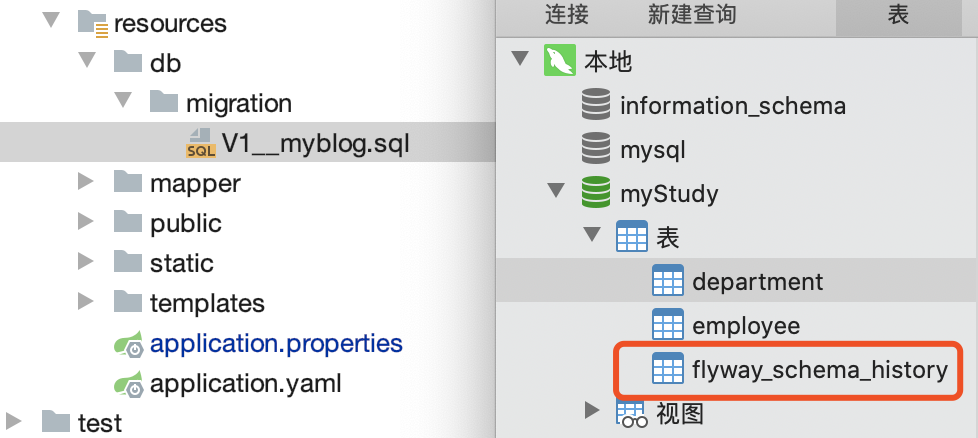
小结:至此我们完成SpringBoot web 项目的搭建,以及thymeleaf 模板的集成和数据库版本管理插件的集成。